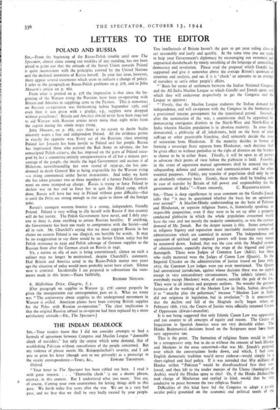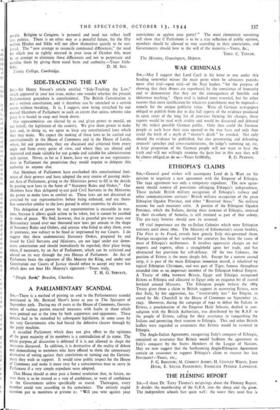Sta,—There is deep significance in your comment on the Gandhi-Jinnah
talks that " it may be questioned whether the basis for an agreement ever existed." A Muslim-Hindu understanding on the basis of Pakistan and Hindustan, or separate religious States, is, historically speaking, an impossible proposition, even if they were to be set up after a properly conducted plebiscite in which the whole population concerned would have the vote and not merely the majority community, as was the curious demand of Mr. Jinnah. But the deeper reason is this. States conceived in religious bigotry and separation must inevitably institute systems of administration which are canonical in nature. The independence and separation of spiritual and temporal powers will from the very outset be narrowed down. Indeed, that was the case with the Mughal system of administration, especially during the reign of the bigoted and pious Aurangzib. There were Judges of Common Law (Adils); but those who really mattered were the Judges of Canon Law (Quazis).. In the Imperial Circular on the administration of justice issued on June 16th, 1672, the Common Law judges were not even mentioned. The Quazis had unrestricted jurisdiction, against whose decision there was no appeal except in very extraordinary circumstances. The infidels (zimmi, i.e., everybody except Moslems) were, of course, outside the pale of the lass. They were In all intents and purposes outlaws. No wonder the greatest historian of the working of the Moslem Law in India, Sarkar, describes it as " anarchy plus the policeman," because " Moslem Law in India did not originate in legislation, but in revelation." - It is noteworthy that the decline and fall of the Mughals really began when, on February 18th, 1702, the Courts of Justice were officially renamed Courts of .Oppression (diwan-i-muzalim).
It is not being suggested that only Islamic Canon Law was oppressive and ran counter to all concepts of equity and reason. The Courts of Inquisition in Spanish America were not very desirable either. The Hindu Brahmanical decisions based on the Scriptures must have been very oppressive too.
That is the point. The formation of religious States would in itself be a retrogressive step, but to do. so without the consent of both Hindus and Moslems in the areas concerned—that was Mr. Jinnah's proposal over which the conversations broke down, and which, I feel sure, English democratic tradition wou'd never endorse—would simply be a short-sighted and fatal policy. If it was intended that fifty millions of Hindus within " Pakistan " would be disenfranchised first then out- lawed, and then left to the tender mercies of the Ulema (theologians of Arabia), wou'd the Hindus agree to this? Or, if the Hindu Maliasabha took charge of Hindustan and replied in kind, would that be very conducive to peace between the two religious States?
Difficulties of this kind have led the Congress to adopt a purely secular policy grounded on the economic and political needs of the
people. Religion to Congress is personal and need 'not reflect itself into politics. There is no other way to a peaceful future, for the fifty million Hindus and Sikhs will not allow themselves quietly to be out- lawed. The "new attempt to reconcile communal differences," the need for which you so rightly stressed in your issue of October 6th, must be an attempt to eliminate those differences and not to perpetuate and stabilise them by giving them statal form and authority.—Yours D. M. SEN. Trinity College, Cambridge.



























 Previous page
Previous page